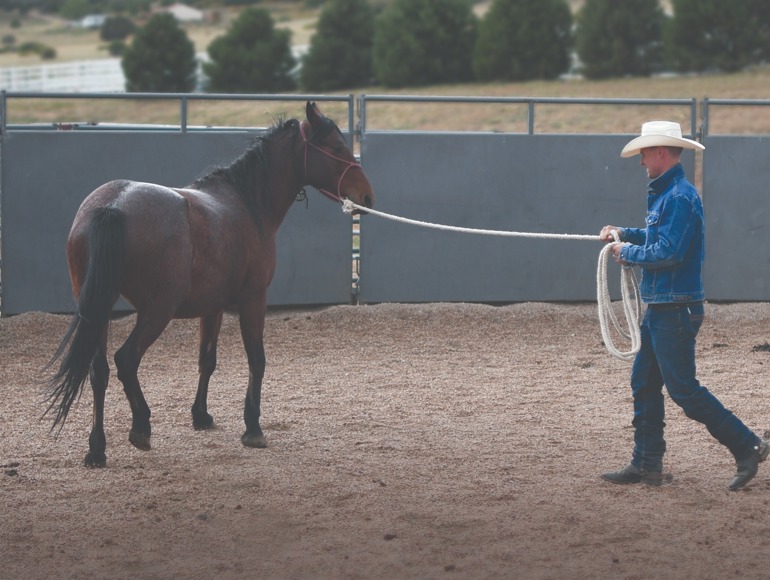Trust lays the groundwork for success

Since 2012, the exceptional staff and volunteers at the Dumb Friends League Harmony Equine Center have provided safe shelter, rehabilitation, and high-quality care for horses in need, primarily those who have been removed from their owners by law enforcement due to abuse or neglect. Rather than a sanctuary, Harmony is a private Colorado facility where horses receive positive, trust-based training in the hopes of nurturing their well-being and eventually connecting them with loving, adoptive families.
Due to the nature or trauma of their backgrounds, many equines who come to us have behavioral challenges that may hinder their progress and likelihood of adoption. Some of the horses we care for have never been handled by people, making them completely unsocialized and wary of human touch or interaction. Others may have received limited or inappropriate training from people in the past, leading to “pushy” behaviors and a lack of boundaries (e.g., crowding, biting, nipping, and walking into/stepping on a person or another horse). Because horses are a social species, what we consider to be pushy or rude may also be the horse’s instinctive way of determining their role in a herd or human relationship. No matter the behavior, patient guidance from trainers and other horses, as well as proper socialization, are needed for the horse to learn and feel confident in themselves and with others.
In order to foster that confidence, Harmony trainers focus on establishing trust with every equine in our care. We practice natural horsemanship, a fundamental training philosophy that rejects abusive or harsh practices, emphasizes rapport and trust-building, and respects the natural behavior of free-roaming horses. On any given day, a Harmony trainer will typically work with six of the horses in their care, using both mental and physical training methods. Brent Winston, Harmony’s Team Leader of Equine Training, is a strong proponent of mental techniques, knowing that a horse will eventually look to him for structure and direction. “Once trust is established, I can get the horse to do anything physically,” he said.
Training at Harmony is also about learning the horse’s individual triggers and helping them cope with the complexities and unpredictable aspects of the world around them. Horses are prey animals, meaning they are hard-wired to respond to perceived threats in order to survive. “Horses don’t need a stress-free life,” said Harmony trainer, Sam Grogan. “They just need a life where they can understand where stressors are and how to [manage] them.” In fact, once trust has been built, our trainers will often introduce uncomfortable situations so they can train the horse through new experiences and help them feel more at ease in the future.
On average, most horses who are halter broke stay at Harmony for 177 days before they are adopted. During this time, they receive veterinary and farrier care, and then spend roughly three months working closely with a trainer. Horses available for adoption generally fall into two broad categories – those who can be ridden and those who cannot. “Non-rider” horses are often older or have an injury that makes bearing extra weight painful. While they can be more difficult to adopt, these horses should not be overlooked as they make wonderful companions for other horses, animals, and people.
Harmony’s “rider” horses are classified according to five different riding levels. Those at the Riding One level are just getting started under saddle and may still be prone to spooking or bucking, whereas horses in Riding Five are gentle and suitable for families or beginners who know the basics of equine care. Most of the rider horses we adopt out are at the Riding Two or Riding Three level.
If you are interested in giving a home to a deserving equine in our care, we encourage you to visit our website at www.ddfl.org/adoptable-equines. Once a prospective adopter completes our adoption form, a trainer will arrange a time to discuss the individual’s needs and how their lifestyle fits with the horse they have in mind. We also ask people to visit us at Harmony, meet the horse, and, if applicable, take a ride around our indoor arena or round pen. Depending on the person’s comfort and experience, we may require them to return for three free lessons with our expert trainers. Finally, our staff will conduct a virtual or in-person site visit to ensure everything is in harmony before adoption day.



